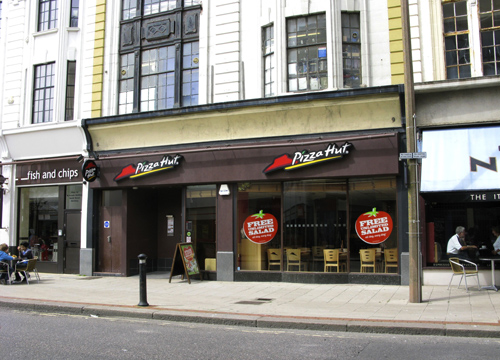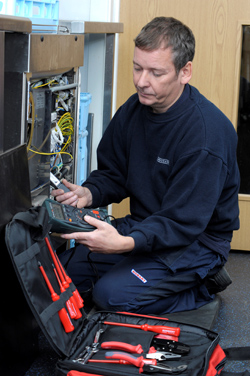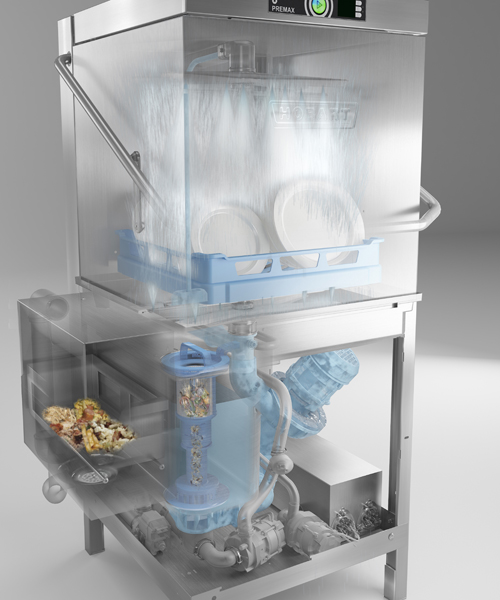Ware and tear: Warewashing solutions
The casual-dining revolution is putting unprecedented demands onto staff and warewashing equipment. But there are solutions out there, finds John Porter
The UK's casual-dining boom has changed the way consumers eat out. For the 1970s generation, a prawn cocktail, steak and chips and black forest gâteau at the Berni Inn was an occasional treat and the arrival of MacDonald's an exotic novelty.
Today, consumers can eat continually, from breakfast time though to the early hours; from a Monday-morning bowl of porridge at a sandwich bar right through a leisurely gastropub Sunday lunch. The choice of brands and cuisines is bewildering, consumer tastes ever more fickle and diverse, and competition among operators is fierce.
This has created new opportunities, but also challenges. More diverse menus, longer trading hours and pressure for space when developing new units has thrown down the gauntlet, not only to operators, but also to equipment suppliers and warewashing in particular.
"This sea change in eating habits means that high-quality cleaning power is only one of the requirements of the modern warewasher. All-day dining requires more ware, and more ware means more cycles.
"With a greater throughput, casual-dining operators need to work smarter to keep the tables turning; it stands to reason that the machines they employ in the kitchen should also follow suit. Catering sites stand and fall on the synergy between the equipment and human operator, meaning modern machines must be intuitive and easy to operate, as well as sturdy and economic."
Simon King, managing director at Burger & Lobster, sums up the operational approach to selecting a warewasher. "Reliability is a major factor, as well as the availability of spares - there's nothing worse than waiting a week for a replacement part. Then, of course, you want the network of approved engineers.
"For a business in roll-out like ours, in my opinion, the best course of action is to find a machine that you're happy with and negotiate a bulk purchasing deal. Deciding on the product on cost alone is a mistake."
Changing trends in casual dining also create challenges, says Bender. Many on-trend dishes require warewashers to work harder, as do speciality coffees and cocktails. "In particular, foods that have high protein and starch content, such as macaroni cheese, egg and pasta dishes, and any food that readily bakes onto dishes, challenges both the machine and the chemicals. Strong coffees leave a real tannin stain and that requires both a mechanical and chemical combination to deliver good results."
Despite space restrictions, this means the minimum requirement for a busy casual-dining outlet is both a dishwasher and a glasswasher, says Bender. "Our recommendation, and that of most manufacturers, is that you will not be able to wash both food and drink successfully through one style of machine. You need a glasswasher with chemical treatment and a dishwasher with stronger chemicals, longer cycles and higher temperatures for dishes and cutlery.
"In a really tight area it is possible to put the dishwasher and the glasswasher next to each other so it doesn't increase the footprint, but two machines would be the recommendation."
PizzaHut
Hobart has been working with Pizza Hut for 10 years, tending to the warewashing needs of its 273-strong portfolio of restaurants.
With an ethos of listening to the challenges of end-users and working to develop bespoke solutions accordingly, the manufacturer has created a machine which, in the words of Malcolm Merry, property manager for Pizza Hut, is now "all but bulletproof"and able to stand up to the rigours of all-day dining in one of the UK's most popular chains.
Merry says: "We have an extremely good working relationship with Hobart, which is evidenced by us specifying both their hood type and undercounter glasswashers in every restaurant. This partnership has resulted in the two businesses working together to develop an AUP hood-type machine that has helped us address a number of challenges.
"A lot of the ingredients we use - cheese and shredded vegetables for instance - can mean a lot of waste in the machine. However, with the company's Permanent-Clean filter system, you don't need to change the water, regardless of the condition of crockery or cutlery."
The filter system directly pumps all the soil carried into the machine out of the dishwasher, meaning dirty plates can be stacked directly in the rack. The more fine and coarse soil carried into the dishwasher, the dirtier the wash water gets. In the past, this would mean the water needed emptying and refilling during the day. The revolutionary and unique soil removal system removes this need, transporting all residue away from the dishwasher and saving water, energy and detergent costs.
Another innovation made in partnership with Pizza Hut was the creation of a bespoke heat recovery unit. Hobart's hood-type uses the energy from the hot drain water, reducing consumption by some 35%.
Merry adds: "Pizza Hut is big on corporate social responsibility, so making sure the machines are as efficient as possible is key. In the past we might have bypassed the heat recovery due to high food soil loads in the water, but that defeats the object of its existence. Hobart was able to develop a bespoke solution which is simply brilliant."
Service and maintenance
Tim Bender says: "I would say that routine maintenance is still something that's not thought about - the approach is to wait until it breaks down and then call somebody."
Although he acknowledges that it's not as simple as looking at a machine and predicting what will go wrong next. "We are currently looking at ways to determine the life expectancy of key components in a machine and then predict when they should be replaced to provide continuity of operation and minimal downtime."
Mitchells & Butlers has Prosurance coverage at more than 150 of its outlets. John McCleary, the company's head of building maintenance, said: "Having Prosurance means we've seen a significant reduction in equipment downtime, with a 24% decline in breakdown call-out time and a corresponding reduction in maintenance costs."
Operator knowledge is also key to keeping equipment running, but in an industry with high staff turnover this is often neglected. Somerton says: "When new equipment is installed, there will normally be a manager or supervisor on-site, so they are given the lowdown and pass it on."
Bender believes operators should make more use of training support from suppliers. "We guarantee training for life on all our equipment. High turnover of staff isn't a problem - they can call us back in to do more training as required. We have our own team who can fit around operators' schedules."
Plates and glasses
There may have been a social media backlash in the form of the 'We Want Plates' campaign on Twitter, but the trend to serve food on a range of receptacles, such as slates and boards, shows no sign of abating.
Darren Somerton, operations manager at gastropub operator Whiting & Hammond, says: "Customers now expect it, and to keep up with trends and make the food look appealing is a challenge in terms of the different shapes, size and styles of crockery we use. We are putting more demands on our warewashing kit as a result."
At Burger & Lobster, all the food is served on stainless steel, which "was chosen for ease of delivery, ease of stacking and durability," says managing director Simon King.
Despite this versatility, says Tim Bender, "there's not many people designing baskets to take these new items, although we are looking at the moment at racks to take slates and boards, because they do pose a slightly different problem."
Booming sales of cocktails and craft beer have also thrown down the gauntlet. Somerton says: "We've introduced more cocktails in response to demand from our clientele, which wouldn't normally have been something you'd do in a traditional pub. Our glassware range is now more diverse to cater for all of that."
Bender says: "There are now so many craft beer, wine and cocktail glasses, but we do have baskets for every type, where the glass sits inside the compartment and is protected."
The machines
Hobart GC Glasswasher
For outlets with less space, the compact GC Series Glasswasher claims efficient consumption of just 1.9 litres per cycle. The GC series also uses less detergent and rinse aid, while an "intelligent" Integral Soil Sensor adjusts the rinse consumption depending on the soil levels in the wash tank.
Cleaning is made simpler with the addition of new clip-in Wash and Rinse Arms designed for removal without the use of tools. A USB-interface allows operational data to be transferred to a PC, while the control board can be easily accessed by a service professional without having to remove the machine from under the counter.
With pressure on space meaning equipment is often installed under the counter and close to guests, the Soft Start Protection feature reduces noise emission.
Hobart FX and GX Undercounter Machines
For casual-dining kitchens, Hobart's latest FX undercounter and GX glasswasher machines reduce operational costs and offer a host of new features. Just one machine can reduce the CO2 emissions of an operation by over 1,000kg in a year, while washing 50 cycles per day, 365 days a year with the Hobart's FX could save 1700kWh of energy, 20,000 litres of water and 65 litres of chemicals.
The optional two-in-one racking system doubles the machine's capacity, allowing for larger loads when needed, while the machine's functionality can be controlled through the new Visiotronic display, which can be customised to use text and/or symbols.
The optional Hydroline ROI-500 system employs reverse-osmosis technology to produce streak-free glassware and cutlery, while removing minerals from the water to produce savings of up to 30% in terms of chemical usage.
Hobart PREMAX AUP Hood-Type with Automatic Soil Removal (ASR)
Hobart's PREMAX AUP hood-type warewasher saves larger casual-dining sites significant time, resources and utility costs. It features in-built technologies designed to save time and help keep kitchens ticking in the heat of service.
The intensive Power Plus Wash programme means no manual pre-washing of heavily soiled ware, and uses steam washing to remove dried proteins and starch residues, while knives and forks can be washed without prior soaking.
More time savings come through the ASR filter system, which directly pumps all the soil out of the dishwasher, meaning dirty plates can be stacked directly in the rack. Eliminating the need to empty and refill several times a day, the filter system saves an estimated £600 a year in water, energy and detergent costs.
Operators' wishlist
Warewasher manufacturers often focus on the big numbers, whether it's the amount of items washed in a year of operation, the working hours saved, the amount of water undrained or the C02 left unreleased by energy saving or environmental features.
For operators, it can just as often be the smaller issues that make all the difference in getting through the working day. We asked casual-dining operators for some of the day-to-day challenges they face with warewashing.
The space race
With much of the casual-dining boom taking place in retail and leisure developments and town centre commercial property conversions, developers will often try to squeeze in just one unit.
For operators trying to maximise trading space in such units, positioning the warewasher can often be the final piece in a jigsaw that just fails to fit. Simon King of Burger & Lobster says: "Restaurants are now often shoehorned into the space that's available, and as such a standard specification for warewashers is difficult to achieve."
Tim Bender says: "In terms of unit size, developers are always trying to get more out of less, and the dishwash area has always been one of the most compromised. In casual dining, maximising floor space for selling leaves less space for things like washing up."
The size issue, says Bender, "also ties in with capacity. There is big pressure on all manufacturers to produce faster machines that will wash things quicker. So we're always looking at how we can improve the machine operation and work space ergonomics and make the handling easier so operators get greater throughput."
Kissing with confidence?
The drive to make pubs and bars more female-friendly has had one unforeseen, but very visible, consequence. "Lipsticks that can be worn without having to be reapplied can be a challenge," says Somerton. "At several of our sites we have to prewash glasses before we put them into the machine, because otherwise it just doesn't come off, no matter what chemicals you use."
This is a problem that won't be going away quickly, admits Bender. "Lipsticks are a waterproof, grease-based product. There is no effective way that a glasswasher with dosed chemical will remove it.
"Chemical manufacturers have tried. The concentration in the machine needed to take it off the glass could mean that the glass itself would get damaged. It's still down to a sponge and solvent to get the lipstick off before the glass goes into the machine. At the moment, it's a problem that we don't have a solution to, but we are working on it!"
This article is in association with Hobart
Continue reading
You need to be a premium member to view this. Subscribe from just 99p per week.
Already subscribed? Log In












